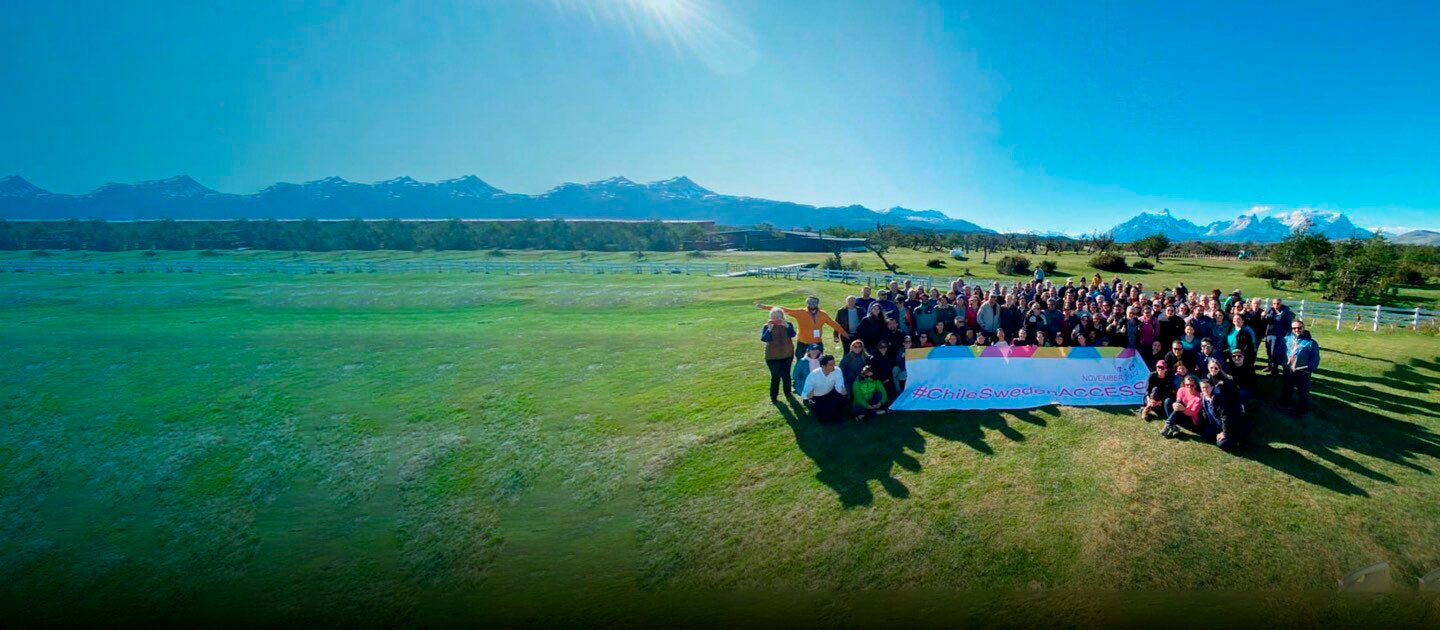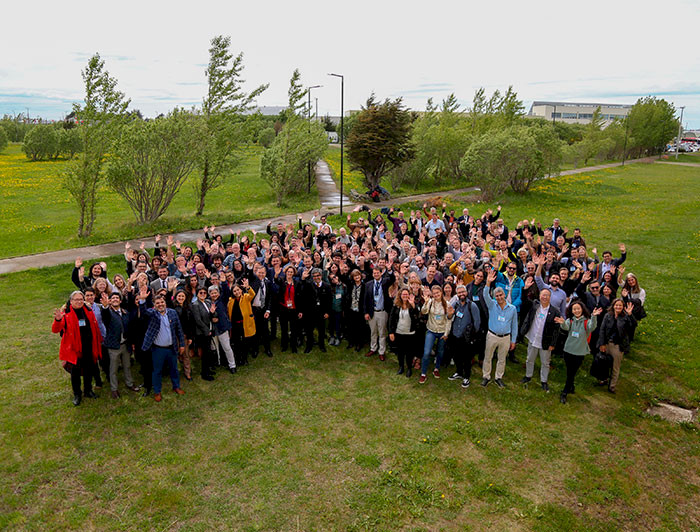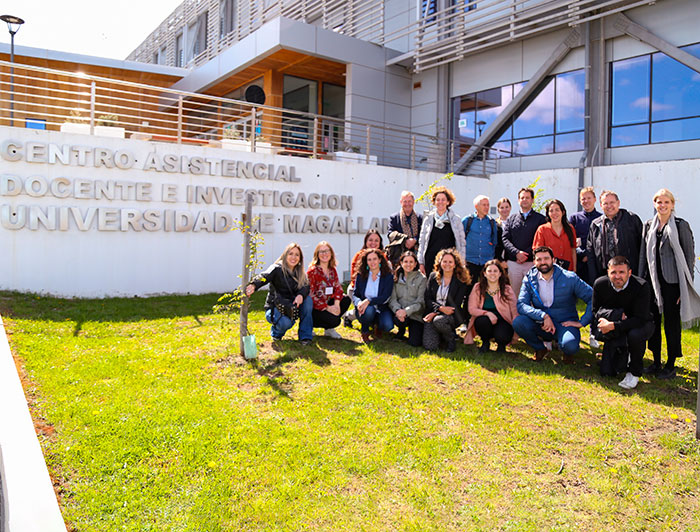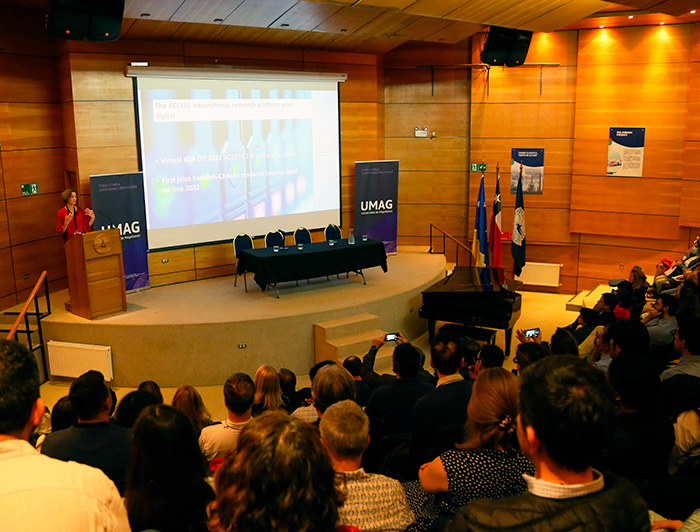
Collaboration Between Chile and Sweden Brings Promising New Benefits
Nearly 200 researchers from both countries met in Punta Arenas to discuss and share their experiences. They worked together intensively for an entire week in pursuit of new collaborations that continue to contribute to four Sustainable Development Goals (SDGs).

photo_camera Nearly 200 researchers from Sweden and Chile met in Punta Arenas, at Universidad de Magallanes (UMAG), for the Third ACCESS Forum. (Photo: Academic Collaboration Chile Sweden)
“Fear is not communicated, it is contagious,” uttered Liliana de Simone, a faculty member of the UC Chile Faculty of Communications, to a working group at the Third Academic Collaboration Chile Sweden (ACCESS) Forum.
The event–organized by the ACCESS (Academic Collaboration Chile Sweden) Platform –brought together nearly 200 researchers from both countries in Punta Arenas, at the Universidad de Magallanes (UMAG), between November 7 and 12.
Professor De Simone, principal investigator of the forum’s Research Theme group No. 9, explains the key role of Sustainable Communication in facilitating, accompanying, and promoting more sustainable forms of human development.
“We have seen that promoting fear of climate change isn’t helping, we need to look for new communication strategies,” added the architect and PhD in Urban Studies, who has specialized in urban communication, consumption, malls, and cities.
Each of the forum’s twelve Research Themes seeks to contribute to these four Sustainable Development Goals (SDGs) of the United Nations:
- Good Health and Well-Being (No. 3)
- Life Below Water (No. 14)
- Life on Land (No. 15)
- Sustainable Cities and Communities (No. 11)
Liliana De Simone’s group focuses on SDG 11 and the communication challenges and future development perspectives towards sustainable cities and communities.
Professor De Simone has been working with Henrik Rahm of Lund University for some time.
They met in the previous ACCESS Forum, which was held in 2018 in Santiago. It was then that they realized the potential of a joint collaboration.
In 2019, professor De Simone traveled to Sweden together with Claudia Labarca, also a faculty member from the UC Chile Faculty of Communications, to meet the Swedish team, including Alexander Paulsson, from Lund University.
The four professors began planning an online English course: a seminar for doctoral students from both universities, titled "Discourse(s) in Economics and Business", which they started to teach in the second semester of 2020.
It was like an omen as the pandemic made remote classes the standard. Three editions of the course have been successfully taught.
Collaborations of this kind are exactly what is sought after in these events.
“We hope that the academic exchange that took place during the forum will:
- foster new collaborations between Sweden and Chile;
- stimulate existing joint pedagogical and research projects;
- deepen the understanding of the culture and social conditions in both countries;
- increase the mobility of students, researchers and personnel between the two countries, as well as
- increase the creation of new joint degree programs.”
That is what UC Chile Research Vice President Pedro Bouchon had to say about the event.
In fact, thanks to the forum and after three years, De Simone, Labarca, Rahm and Paulsson met again and renewed their desire to collaborate.
They plan to apply for a fund from the National Research and Development Agency (ANID, as per its Spanish acronym) and have even advanced the topic they want to address at the Fourth ACCESS Forum, to be held in 2024 in the European country.
"We want to lay the foundations for education for sustainability and enhance the role of communications: how campaigns and programs are strategically planned to change practices to reverse climate change," said Dr. De Simone. The newly mother was able to travel with her young daughter Elena and her mother and attend the forum.
"I have to thank the Office of Research of the Office of the Vice President for Research for giving me the opportunity to travel with my baby girl and a caregiver. I think we need to highlight the opportunities we are being given to be able to resume our academic careers after becoming mothers and to be able to give a touch of everyday life and reality to academic events. I am incredibly grateful to have been accommodated and to have been given the opportunity to involve Elena in a beautiful academic community," she said.
“For us it is important to provide concrete support to female faculty members to help them make their careers compatible with their personal lives, only in this way can we encourage female participation and leadership in academia and in research, development, innovation, and entrepreneurship projects,” commented Maria Elena Boisier, Director of the Research Office—a unit of the Office of the Research Vice President in charge of organizing the forum on behalf of the UC Chile—and director of the Innovation in Higher Education (InES) project on gender equality.
A New Generation of Researchers

Another objective of the ACCESS Platform is to support the education of doctoral students.
In addition to specific courses for this audience, 33 doctoral students from both countries participated in the forum.
Ulda Figueroa, a lawyer who is pursuing a doctorate in sociology at UC Chile, is one of them. His specific area of research is criminology or the social study of crime, which according to the young researcher, is a science that has been more concerned with what happens at the end: the prison sentence, what inmates are like, and social exclusion.
"But we know little about other kinds of intermediate responses, which happen early in the process in second degree crimes or misdemeanors and first-time offenders," he said.
Figueroa participated in group No. 3, called "Crime as a Social Problem".
"The forum has been really interesting because, I had never experienced a work logic like ACCESS, at least compared to my experience participating in other national congresses. What I have enjoyed most is the opportunity to talk with young researchers and with more experienced professors, from our universities and from Sweden. It has been an opportunity to learn the practices and rituals of academic life in a peer environment. Plus, the organization has been great!" commented Figueroa.
María Consuelo Arias is a sociologist with a master's degree in rural sociology from Mexico, and began her involvement in rural development working with Indigenous textile women in Chiapas.
"I learned about the tools available for the productive advancement of women, I saw public policies in this regard, and I realized that my area was missing the economy," Arias explained.
When she returned to Chile, she began to collaborate with the UC Chile Faculty of Agriculture and Forest Engineering and realized that studying a doctorate in agricultural sciences would contribute to that area she was missing.
Today, she works in food safety, water quality, and transfer of innovative practices in small-scale farms for water improvement.
Arias’ participation in the forum has more to do with her background. She was part of group No. 10 on "Memory, Heritage and Coloniality. Linkages between Chile and Sweden."
"It has been a very good opportunity. We share experiences with different people who are in their own territories, in their own universities, and who are reflecting on how to create links between Sweden and Chile, to be able to think of something new or incorporate dimensions," she summarized.
Leading Researchers
While it is true that ACCESS supports new researchers, investigators with established careers also participate in the forum.
One example of this is group No. 8, "Immunology & Health. A Personalized Medicine Approach," lead by Gareth Owen, a faculty member of the UC Chile Faculty of Biological Sciences, and Masood Kamali-Moghaddam, from the Department of Immunology, Genetics and Pathology at Uppsala University.
Alexis Kalergis and Pablo González, both professors from the Faculty of Biological Sciences and key researchers in Sinovac studies in Chile, also participated in this group, together with senior scientists from the Universidad de Magallanes and the Universidad de Chile, such as Leandro Carreño and Flavio Salazar, former Minister of Science, Technology, Knowledge, and Innovation.
"We had a good group, quite heterogeneous, so we were able to cover diverse topics within immunology. I think we somehow complemented each other with our different experiences, platforms, and biobanks. I really hope that we will continue these collaborations," said Kamali-Moghaddam.
In fact, the group covered both diagnosis and management of Covid-19, as well as new cancer therapies, which have been evolving from chemotherapy to immunotherapy, a treatment that triggers the body's own natural defenses against the disease, thus having fewer side effects.
Among the participants were experts in CAR T Cell, “the new revolution in cancer treatment," according to Owen. This technique genetically modifies T cells—a type of white blood cell—to find and destroy cancer cells.
In terms of Covid-19, Dr. Owen reported that both Chile and Sweden had approximately the same incidence of death.
"But our colleagues in Sweden have dealt with the situation in a completely different way. For example, one of the people within our group showed us an application that collected data from up to half a million people in Sweden to track Covid-19. In Chile we did not have this. So we need to hear how they dealt with the problem and understand why our method was so different."

Dr. Owen also highlighted the high level of UMAG in biomedicine, especially in cancer diagnosis.
In 2019, UMAG and UC Chile inaugurated the Center of Excellence of Biomedicine in Magallanes (CEBIMA), whose director is Nibaldo Inestrosa, a faculty member of UC Chile.
Cebima is housed in the modern building of the Teaching and Research Assistance Center (CADI), which the forum attendees were able to see.
"Marcelo Navarrete (coordinator of the CADI-UMAG laboratory) brought doctoral students to present novel topics, pioneers in Chile. I was very surprised and happy to be able to count Magallanes as a force to be reckoned with in biomedicine in Chile," stated Owen.
This group was focused on the health and wellness SDG.
"What we develop here can be implemented in the rest of the world. I think we should be generous with others, try to help, because that's what science is all about: working together. Just look at the publications, before there were two authors: just a principal investigator and a PhD student, now we have different teams, which shows how we can work better together and produce better things as well. Science is advancing all the time and that is to some extent thanks to collaboration," Kamali-Moghaddam explained.
And Owen added:
"No one has a scientific meeting with a person on the other side of the world and comes out as the same person. I'm going to think in a totally different way, as will every participant in the meeting, and that can't be quantified."
They are working to obtain concrete results. For the next forum they plan to focus on virus and cancer diagnostics and to intensify the collaboration that began after the previous forum and that was interrupted by the pandemic:
- Joint publications
- Academic exchange, especially among doctoral students
How Did the Forum Come About?
The ACCESS platform (Academic Collaboration Chile Sweden) was created in 2016 by Universidad Católica and Universidad de Chile, and by the Swedish universities of Lund and Uppsala.
It aims to facilitate and deepen academic relations between the two countries, and promote connections and collaborations between researchers, students, professionals, and staff.
Its main event is the ACCESS Forum, which had not been held since 2018 due to the pandemic.
The first Forum took place in 2017 in Sweden. The following year, the hosts were Universidad Católica and Universidad de Chile. As the platform has been growing—it is currently made up of eight Swedish and seven Chilean universities—it was the turn of Universidad de Magallanes (UMAG) to host this year's forum.
For each event, an organizing committee is formed by the founding universities of ACCESS, plus the host university.
Preparations for the 2022 Forum began in late 2021. It began with a call for researchers to apply to the Research Themes Groups.
There were two requirements: they had to have a principal investigator from a Chilean university and another one from Sweden, and contribute to at least one of the four Sustainable Development Goals (SDGs) defined for this opportunity. According to the regulations, three of them are defined by ACCESS and a fourth is added by the host institution.
On this occasion, UMAG chose to add Life Below Water (SDG 14).
At the end of April, the committee in charge met in Santiago to elect the 12 Research Themes that would be part of the 2022 Forum, and a third of them were dedicated to sustainable production in aquaculture and water care.
"To have an event of this scale is a source of pride for us as part of the organizing team. Nearly 200 researchers from Chile and Sweden participated in 12 interdisciplinary Research Themes in the Magallanes region, after three years on hold due to the pandemic. It is also a clear sign of the reactivation of academic cooperation and the interest in reconnecting for sustainable development, which is what inspires this Forum," commented María Elena Boisier, UC Chile Research Director.
Christian Blanco, deputy director of International Funds of the Office of Research, added:
"In addition to the interdisciplinary conversations at each workshop session, the ACCESS Forum offers an unprecedented opportunity to build trust and friendships between people. This is the basis on which we can move towards sustainable collaboration in the long term."
Much of the details of UC Chile's organization of the forum fell on the shoulders of Sofia Cubillos, Research Coordinator of the Office of Research.
"Although I have organized several forums over the years, I am always surprised at how different each one is. The dynamic of rotating host universities gives each forum a distinctive touch and invites participants to immerse themselves in a culture that permeates the topics being discussed," she explained.

Academic Collaboration Chile Sweden: Hej Estocolmo!
"ACCESS reflects very well the relationship between Chile and Sweden, which has historically been very close. Today we have about 60 thousand people in Sweden who are of Chilean origin (in a country with a little more than 10 million inhabitants), many of them have a part of their lives in Chile and the other part in Sweden. In addition, we share important values, such as democracy, gender equality, the importance of science, and innovation. This fits very well with what ACCESS does, so I think it is an excellent collaboration that we should support in every possible way," explained Tomas Wiklund, Chile's ambassador to SwedenTomas Wiklund, Chile's ambassador to Sweden, who actively participated in this version of the Forum.
Ken Benson, professor of Hispanic literature at Stockholm University, fully agrees with the ambassador.
"The richness that immigration brings is something that ACCESS takes advantage of on a scientific level."
Benson said he is "thrilled" that his university will host the next forum in 2024 and explains in his perfect Spanish how this opportunity came about.
He recalls that when ACCESS was being developed, together with Astrid Söderbergh, President of Stockholm University, he made a strategic tour of Latin America. In our country, he met with his peers from UC Chile and Universidad de Chile.
A few months ago, Benson wanted to ask Söderbergh to have their university host the next forum. But it him took six weeks to be able to talk to her. He prepared a thorough presentation.
"She has a great memory. So, when I reminded her of that trip and the importance of this collaboration, in just two days she had the decision formally made. That's what our president is like! In Stockholm, they are going to be really happy as ACCESS is strongly supported,” said Benson with a big smile.


